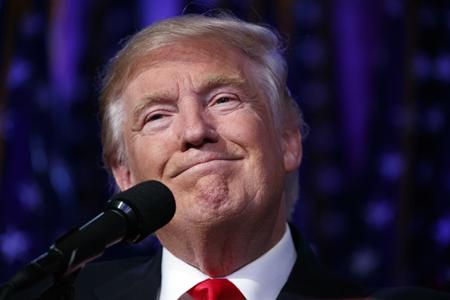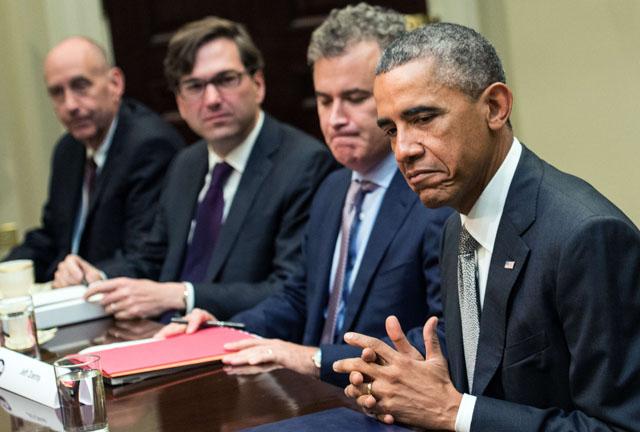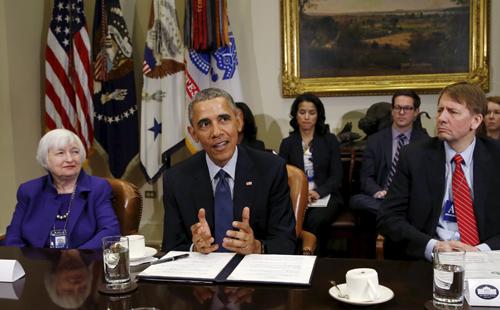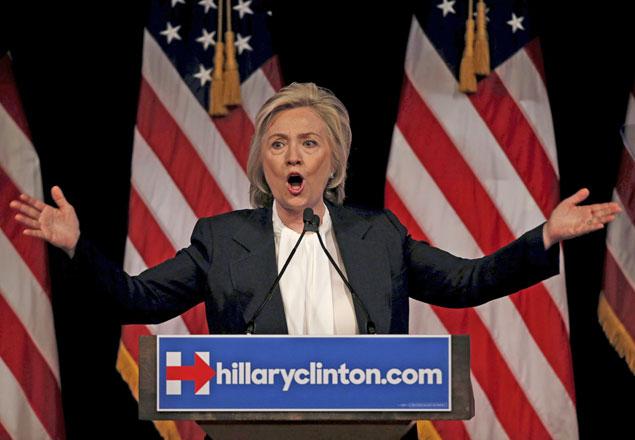You are here
Taxes? Trade? How Trump could affect key areas of economy
By AP - Nov 10,2016 - Last updated at Nov 10,2016

After Donald Trump's victory in the US presidential election, the world was left wondering how his policies, yet unclear, will affect the economy (AP photo)
Donald Trump won the presidency by pledging to restore a vanished and golden economic era, when growth roared, factory jobs flourished and America sat unchallenged atop the global economy.
Yet, he never offered much of a roadmap.
Which is why it's far from clear how Trump will affect the economy, even though his agenda enjoys the advantage of Republican control of both the House and Senate. Trump has pledged to revitalise the mainly white working class that elevated him — a tough task given an ageing US workforce, dwindling options for people with little education and years of stagnant pay.
Trump has said he'd slash taxes, strong-arm US trading partners, end commitments to environmental rules and make it easier to drill for oil.
He would lift federal regulations, void President Barack Obama's healthcare law and curb immigration and, of course, build a wall on the Southern border — and force Mexico to pay for it.
Those steps, Trump says, would turbocharge the economy. Yet, many economists warn that his plans could spike the national debt, ignite trade wars and perhaps cause a recession.
It is impossible to tell how his presidency will affect the economy and financial system just because so much is unknown, said Michael Arone of State Street Global Advisors:
"What policies will he pursue? How he moves from election to governing is unknowable."
Here's how Trump's presidency might affect sectors of the US economy and financial system:
Economy and federal reserve
The president-elect has said he can get the economy to grow nearly 4 per cent a year; it is now running at half that pace.
He would ignite that growth, he's said, by cutting taxes by roughly $6 trillion over 10 years, expanding oil and natural gas production and slashing most federal regulations.
Yet few analysts think the economy can expand much faster. An ageing population means the workforce is adding fewer people, a recipe for tepid growth. Productivity — output per hour worked and vital to economic health — is chronically sluggish.
Those trends help explain why the Federal Reserve says the economy's long-term annual growth is a slow 1.8 per cent. That's a rationale for keeping interest rates near historic lows, especially with inflation tame. Trump has called Fed Chair Janet Yellen essentially a puppet of Obama. Yellen has inflated a stock bubble, Trump argues, by keeping rates too low for too long.
Yellen's term as chair will end in early 2018, and Trump will not likely re-nominate her for a second term. Still, analysts do not expect Yellen to resign before her term ends, in part because of the disruption it might cause in financial markets.
The Fed has been considered all but sure to raise rates at its next meeting in mid-December, reflecting a strengthened US economy. After Trump's victory, investors still peg the likelihood of a December rate hike at 81 per cent, according to the CME Group.
Infrastructure
Trump has vowed to fix roads, bridges and airports — a sticking point in recent years as Congress and Obama failed to compromise on ways to pay for repairs to ageing infrastructure. As president, he said, he'd rely on tax credits to incentivise development.
Taxes
Trump's election could mean a big tax cut for affluent Americans, particularly the richest 1 per cent, and a much smaller tax cut for many others. Analysts say those tax cuts would likely boost growth in the short run. But if all his changes were enacted, they would balloon the budget deficit and potentially lift interest rates and shrink the overall economy, economists say.
Nearly half the benefits from Trump's proposed tax cuts would flow to the top 1 per cent, according to the non-partisan Tax Policy Centre. They'd receive an average tax cut of $215,000, lifting their after-tax income by 13.5 per cent, the policy centre found. The top 0.1 per cent would get a tax cut exceeding $1 million.
Trump has proposed reducing the top bracket's tax rate from 39.6 per cent to 33 per cent. He would end taxes on estates and repeal some taxes on investment income. The corporate income tax rate would sink to 15 per cent from 35 per cent.
On average, middle-income households would receive a tax cut of $1,010, lifting their after-tax income 1.8 per cent, the Tax Policy Centre says. But some middle- and lower-income households would face tax increases.
That's because his plan eliminates the personal exemption, which lets households reduce taxable income for each household member.
Trade
Trump says the economy's sluggish growth is due to trade deals negotiated by incompetent leaders who betrayed workers, choosing instead to favour rich donors.
Mexico, China and Japan, he argues, operate by rules that have hurt the United States. He says agreements to open markets, like the North American Free Trade Agreement, led firms to ship factory jobs abroad — a trend he would stop by renegotiating these deals and penalising US companies that move manufacturing operations offshore.
Trump says the result of these trade deals is a $500 billion trade gap that he would close by raising tariffs if necessary to restore factory jobs.
Healthcare
Within the healthcare industry, Trump is viewed with trepidation. Insurers, pharmaceutical firms and hospitals would stand to lose if a repeal of Obama's healthcare law, as Trump has vowed, increases the number of uninsured Americans. Even if, as critics like Trump say, the Obama's healthcare law is rife with complexity and complications for health care companies, it does offer the long-term prospect of more paying customers.
Insurance and hospital industry groups reminded Trump on Wednesday of his pledge to replace Obama's law with a system that provides affordable high quality coverage for Americans.
One of Trump's main proposals — allowing insurers to sell policies across state lines — draws mixed reviews within the industry. Smaller insurers tend not to like it, a reflection of the fact that health insurance is still a regional business.
Trump is a wild card for the pharmaceutical industry. At one point, he supported authorising Medicare to negotiate prescription drug prices. He also favours letting consumers buy lower-cost medications from overseas.
Financial reform
The fate of key piece of legislation passed after the financial crisis — the Dodd-Frank regulatory reform law — is now in question. House Republicans want to repeal all or parts of Dodd-Frank.
The twist is that Wall Street, generally, has little interest in repealing Dodd-Frank. Banks have spent billions restructuring themselves to comply with the requirements of Dodd-Frank and generally believe the banking system is stronger with the law.
But the fate of the Consumer Financial Protection Bureau, which was created by Dodd-Frank, now comes into question. Congress has wanted to restructure the bureau to make it a commission, not led by a single director, and to make it subject to the congressional appropriations process. That's now likelier.
Related Articles
President Barack Obama urged top US market regulators this week to look for ways to tailor rules based on financial firms' size and complexity.
WASHINGTON — US economists are growing worried about the Federal Reserve’s (Fed) tightening policy, saying it is dampening economic growth,
NEW YORK — Democratic front-runner Hillary Clinton put the fight for higher wages for everyday Americans at the heart of her economic agenda














